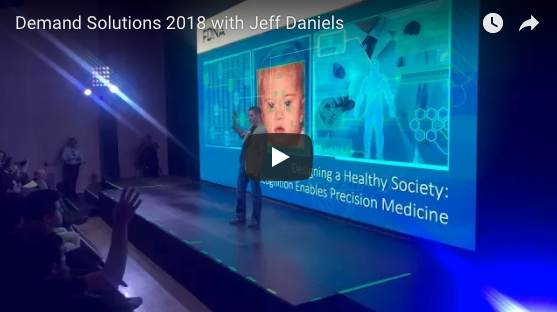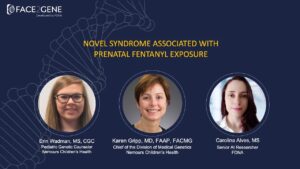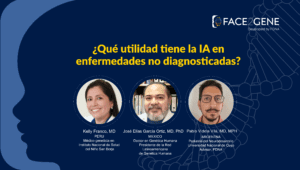In a packed auditorium at Mexico City’s CENTRO University, FDNA’s Senior Director of Marketing, Jeff Daniels, announced the launch of the Genomics Collaborative. This initiative prompts clinicians, patients, advocates and researchers to join forces in an effort to accelerate breakthroughs in precision medicine. The Genomics Collaborative allows participants to access FDNA’s deep learning and next-generation phenotyping (NGP) technology to conduct research for the benefit of patients and health care practices.
Leaders and innovators from around the globe were gathered to learn about breakthroughs from the creative visionaries behind them at the Demand Solutions summit. Hosted by the renowned Inter-American Development Bank (BID), CNN and Entrepreneur Magazine, the event drew over 500 leaders and innovators and showcased thought leaders from startups, including Airbnb and several wearable technology and gaming companies.
During his presentation, Daniels highlighted FDNA’s use of artificial intelligence and facial analysis technologies to help patients around the world. Using the Yellow Brick Road Project’s “Morgan’s Story,” as a backdrop, Daniels shared how the struggle of two little girls and their families is faced by millions of people globally when searching for medical answers.
“With FDNA’s strength being in pattern recognition and artificial intelligence, we thought others might want to access our technology to support their research efforts as well. That’s why we are launching the Genomics Collaborative and announcing projects with hospitals, labs, countries who have genomics projects, patient advocacy groups, and dozens of other types of researchers, just like Morgan and Lillie’s group, the Yellow Brick Road Project. We intend to expand use of this technology to every disease, and to phenotypes beyond facial analysis—like voice, video, metabolites, analysis of clinical notes, and more.”
As part of the Genomics Collaborative, FDNA works with partners to design the future of health, together. By compiling and analyzing case data, such as patient photos, biometric data, clinical notes and disease history, scientists will be able to make breakthroughs in disease understanding. Unlocking the secrets to our genetic makeup is the key to a healthier world. By uncovering the genetic components of diseases, we can shorten the diagnostic odyssey, enable greater and earlier recognition of these conditions in the medical community, and lead the way to more personalized and effective therapy.
Daniels discussed FDNA’s accomplishments over the past few years in this space.
“This is Face2Gene,” said Daniels, as he shared a photograph of a doctor scanning a patient with her mobile phone. “Face2Gene is for healthcare providers, and it works on any computer, tablet or mobile device […] A doctor can take a photo of her patient, or list other patient features, and Face2Gene will produce a list of relevant diseases for the doctor to consider. For thousands of diseases, the technology can provide meaningful insights before symptoms even begin.”
“What’s more,” Daniels continued, “Face2Gene learns from diagnosed cases from its users, getting smarter every day. It’s called deep learning technology. Doctors from over 2,000 institutions in 130 countries worked to train this technology, including hundreds here in Mexico. It already recognizes features and genetic data for over 10,000 diseases.
“Instead of waiting years to get a diagnosis, like Morgan and Lillie did, like many of you or your loved ones have, doctors can tap into the collective experience of thousands of doctors globally to facilitate personalized medicine, getting us answers sooner.”
Get Involved. Join the Genomics Collaborative>>



